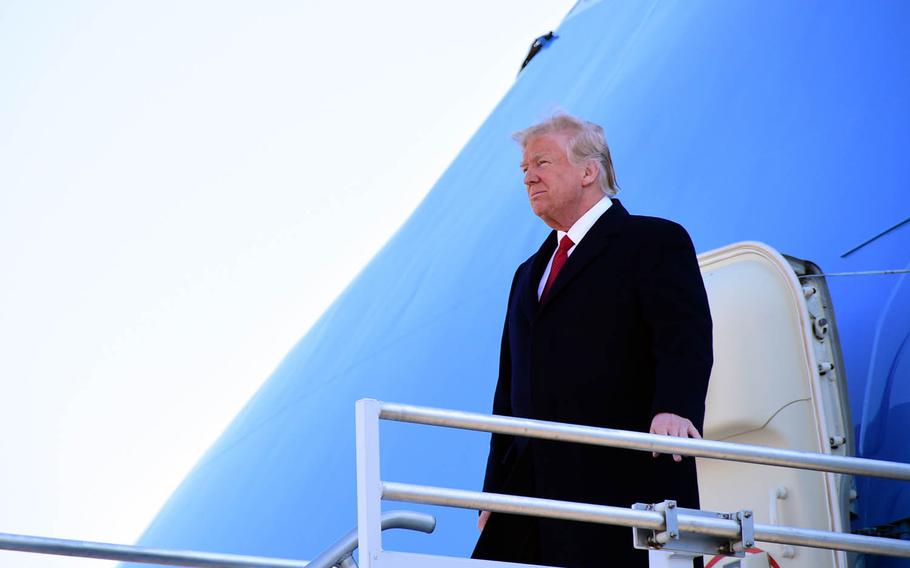
President Donald Trump departs Air Force One at Berry Field Air National Guard Base, Nashville, March 15, 2017. (Jeremy Cornelius/Air National Guard)
TOKYO — President Donald Trump will reaffirm America’s commitment to the Asia-Pacific and build support for a tough line on North Korea during an upcoming trip to Japan, experts told Stars and Stripes Monday.
Trump is scheduled on Sunday to begin his first presidential trip to Japan, where he plans to meet Prime Minister Shinzo Abe, U.S. and Japanese servicemembers and the families of Japanese citizens abducted by North Korea.
The U.S. leader will aim to “put a stake through the heart” of debates about his commitment to America’s allies in Asia during the trip, said Brad Glosserman, a visiting American professor at Tokyo’s Tama University.
Japanese authorities will be listening to see if Trump repeats U.S. assurances that it will defend Japanese control of the Senkaku Islands, which are counter-claimed by China and Taiwan. They’ll also be hoping for a mention of U.S. nuclear capabilities, Glosserman added.
“We don’t need to use nuclear weapons [to defeat North Korea in a war] but the Japanese are always looking for that explicit statement,” he said. “If North Korea thinks they can nuke Japan and won’t be nuked in response that is less of a deterrent. There’s an eye-for-an-eye sentiment.”
Toshihiro Nakayama, a professor at Tokyo’s Keio University, told reporters at the Foreign Press Center Japan that his country is concerned about a nuclear-armed North Korea and the rise of China.
“This part of the world is filled with many issues and challenges and the most clear and present danger is a nuclear-armed North Korea,” he said through a translator. “Japan is a country which states clearly that the emergence of a global order which is China-centric is not desirable for the region or the globe.”
Japan is the country with the best current relationship with America, Nakayama said, citing Abe’s November and February visits to the United States. Trump’s trip will be a chance for him to lay out his approach to the region, which has been unclear due to State Department vacancies, he said.
“This is going to be the first occasion for him to demonstrate his Asian policy and view on Asia,” he said.
Trump’s decision to withdraw from the Trans Pacific Partnership trade agreement was a setback for U.S.-Japan relations; however, the Asia-Pacific region is too important to the U.S. economy to be ignored and America needs a partner like Japan in the region, Nakayama said.
“The Asia-Pacific is viewed as the engine of the global economic growth and for the U.S. to be the resident power in the region is also serving its national interests,” he said. “When [Trump] declared that he would quit the trade deal it didn’t mean the United States would leave this region, rather that was a demonstration of his distrust towards multilateral framework.”
Glosserman said Trump will likely raise the issue of the U.S. trade deficit and there could be discussion of U.S. energy exports to Asia.
“Supplying gas to Asia is an easy, quick and politically acceptable way for Americans and Japanese to get an impact on trade,” he said. “Trump is big on exports of that stuff.”
Nakayama said the U.S. will look to bolster the alliance with Japan because it has few options in the region, stating that the U.S.-Philippines alliance is currently unstable and that South Korea is occupied dealing with North Korea.
He added that Japan cannot stand against China alone and is too dependent on the U.S. to let the alliance wither.
“Japan is a state without a plan B for its survival,” he said. “The United States in the only option and at the same time the best option.”
Stars and Stripes Reporter Seth Robson contributed to this report.